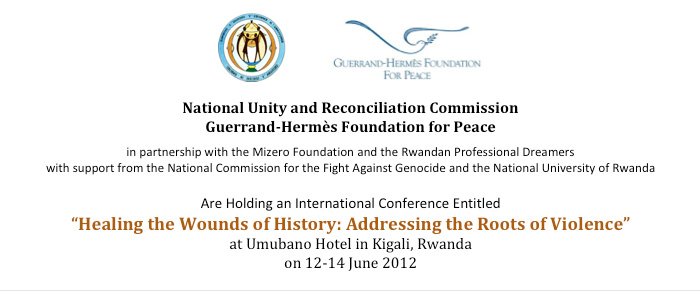 Inspired by hearing of the success of the November 2011 HWH Conference in Lebanon, The Rwandan Government”s NURC (National Unity and Reconciliation Commission) invited many members of the HWH team, including Alexandra Asseily of the CLS, to go to Kigali in June for another 3-day Conference Workshop. This was funded by the GHFP and several Rwandan Government agencies and Rwandan NGOs. Rwandans live with the memories and wounds of past conflicts. The unhealed scars of genocide and other atrocities continue to condition our everyday reaction and inter-action with the ‘Other’. There is an uneasy relationship with our history that had led to the past conflicts and the divisions in the country which highlights the importance to heal an unrelenting memory of anguish. Our creativity and capacity to build a brighter and more peaceful future is inevitably undermined and compromised. The search for novel approaches to conflict transformation and peace-building remain essential in addressing our collective wounds and for finding ways to heal them together. The three-day conference explicitly addressed the need to deal with the deeper causes of violence, to heal the wounds of history and to explore forgiveness as a key in the healing process. The conference aimed to survey theoretically the need for healing in the Rwandan context and to propose a framework for psychological and trauma healing as a response to such needs. It further aimed to construct a safe space for the participants to experience the proposed approaches in an open, non-judgmental and empathetic culture of sharing and compassionate listening. The event was opened by H. E. Dr Pierre HABUMUREMYI, the Prime Minister of the Republic of Rwanda, who was the conference’s Guest of Honour. The keynote speakers were Bishop Dr John RUCYAHANA, the President of Rwanda National Unity & Reconciliation Commission and Hon. Aloisea INYUMBA, the Rwandan Minister of Gender and family Promotion. Further, it gathered persons from diverse groups already working in the fields of reconciliation, community building and education for peacebuilding in Rwanda and beyond. Participants included historians, psychiatrists, therapists, sociologists, politicians, professors, activists, representatives of NGOs in the field and students from around the country and beyond. To find out more about the conference please visit the Healing The Wounds of History website.
Inspired by hearing of the success of the November 2011 HWH Conference in Lebanon, The Rwandan Government”s NURC (National Unity and Reconciliation Commission) invited many members of the HWH team, including Alexandra Asseily of the CLS, to go to Kigali in June for another 3-day Conference Workshop. This was funded by the GHFP and several Rwandan Government agencies and Rwandan NGOs. Rwandans live with the memories and wounds of past conflicts. The unhealed scars of genocide and other atrocities continue to condition our everyday reaction and inter-action with the ‘Other’. There is an uneasy relationship with our history that had led to the past conflicts and the divisions in the country which highlights the importance to heal an unrelenting memory of anguish. Our creativity and capacity to build a brighter and more peaceful future is inevitably undermined and compromised. The search for novel approaches to conflict transformation and peace-building remain essential in addressing our collective wounds and for finding ways to heal them together. The three-day conference explicitly addressed the need to deal with the deeper causes of violence, to heal the wounds of history and to explore forgiveness as a key in the healing process. The conference aimed to survey theoretically the need for healing in the Rwandan context and to propose a framework for psychological and trauma healing as a response to such needs. It further aimed to construct a safe space for the participants to experience the proposed approaches in an open, non-judgmental and empathetic culture of sharing and compassionate listening. The event was opened by H. E. Dr Pierre HABUMUREMYI, the Prime Minister of the Republic of Rwanda, who was the conference’s Guest of Honour. The keynote speakers were Bishop Dr John RUCYAHANA, the President of Rwanda National Unity & Reconciliation Commission and Hon. Aloisea INYUMBA, the Rwandan Minister of Gender and family Promotion. Further, it gathered persons from diverse groups already working in the fields of reconciliation, community building and education for peacebuilding in Rwanda and beyond. Participants included historians, psychiatrists, therapists, sociologists, politicians, professors, activists, representatives of NGOs in the field and students from around the country and beyond. To find out more about the conference please visit the Healing The Wounds of History website. 
